|
|
| Sei in: Cinema e Medioevo ® Indice alfabetico dei film |
RASHôMON
1950, regia di Akira Kurosawa
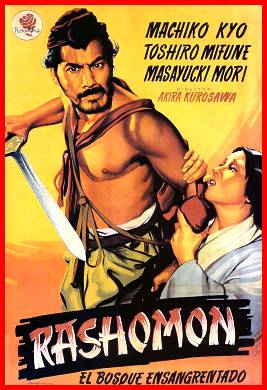
Scheda: Nazione: Giappone - Produzione: Daiei Motion Picture, Daiei Studios - Distribuzione: Cei Incom Vivivideo, San Paolo Audiovisivi, Criterion Collection, Daiei Motion Picture, Edward Harrison, Embassy Home Entertainment, RKO Radio Pictures Inc. - Soggetto: dai racconti di Ryumosuke Akutagawa Rashomon e In a Grove - Sceneggiatura: Akira Kurosawa, Shinobu Hashimoto - Fotografia: Kazuo Miyagawa - Montaggio: Akira Kurosawa - Scenografia: So Matsuyama - Musiche: Fumio Hayasaka - Formato: B.N. - Durata: 88'.
Cast: Toshirô Mifune, Machiko Kyô, Masayuki Mori, Takashi Shimura, Minoru Chiaki, Kichijiro Ueda, Fumiko Honma, Daisuke Katô.
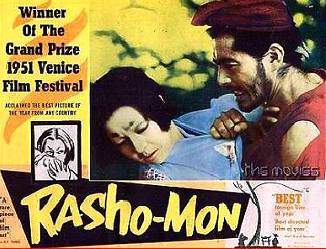
+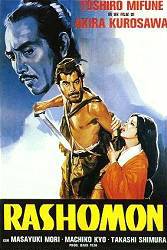
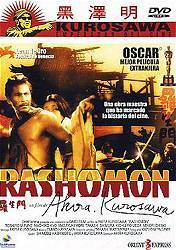
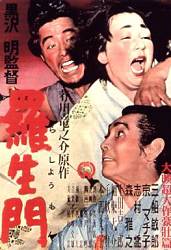
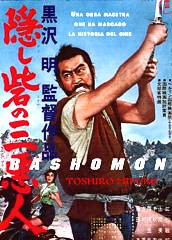
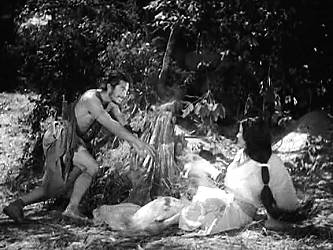
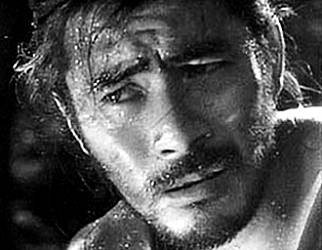
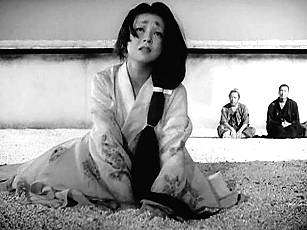
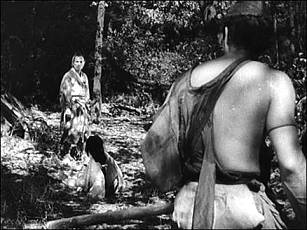
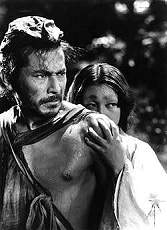
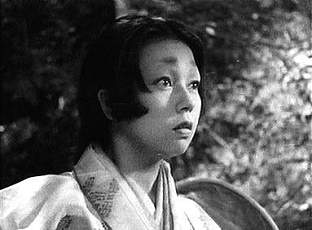
![]() Trama e commenti: cinematografo.it -
mymovies.it
- film.spettacolo.virgilio.it - activitaly.it
- it.wikipedia.org
- centraldocinema.it
- cinemavvenire.it
- cinemadelsilenzio.it
- kataweb.it:
«Sotto il portico del tempio del dio Rasho a Kyoto nel XV secolo un
boscaiolo, un bonzo e un servo rievocano un tragico fatto di sangue, giudicato
in un tribunale davanti al quale hanno deposto come testimoni: un bandito aveva
aggredito un samurai che, in compagnia della moglie, attraversava una foresta,
uccidendo l'uomo e violentando la donna. Alla prima versione dei fatti data dal
bandito segue quella della donna: entrambe sono raccontate dal boscaiolo. Il
bonzo riferisce una terza versione, fatta dallo spirito del defunto samurai,
evocato da una maga. Allora, riprendendo la parola, il boscaiolo confessa di
avere assistito al delitto e racconta ai compagni una quarta versione, prima di
raccogliere un bambino abbandonato e portarselo a casa. Tratto da due racconti
di Ryumosuke Akutagawa (1892-1927), il dodicesimo film di A. Kurosawa vinse a
sorpresa il Leone d'oro a Venezia nel 1951, facendo da battistrada nei festival
e sui mercati europei al cinema giapponese. Scandito dal ritmo ossessivo di un
bolero, è un film in cui le diverse componenti letterarie, psicologiche
(persino psicanalitiche) e drammatiche si fondono in una superiore unità
filmica che rimanda al cinema muto e, insieme, anticipa la tecnica televisiva
con un linguaggio febbrilmente barocco nel suo virtuosistico dinamismo...».
Trama e commenti: cinematografo.it -
mymovies.it
- film.spettacolo.virgilio.it - activitaly.it
- it.wikipedia.org
- centraldocinema.it
- cinemavvenire.it
- cinemadelsilenzio.it
- kataweb.it:
«Sotto il portico del tempio del dio Rasho a Kyoto nel XV secolo un
boscaiolo, un bonzo e un servo rievocano un tragico fatto di sangue, giudicato
in un tribunale davanti al quale hanno deposto come testimoni: un bandito aveva
aggredito un samurai che, in compagnia della moglie, attraversava una foresta,
uccidendo l'uomo e violentando la donna. Alla prima versione dei fatti data dal
bandito segue quella della donna: entrambe sono raccontate dal boscaiolo. Il
bonzo riferisce una terza versione, fatta dallo spirito del defunto samurai,
evocato da una maga. Allora, riprendendo la parola, il boscaiolo confessa di
avere assistito al delitto e racconta ai compagni una quarta versione, prima di
raccogliere un bambino abbandonato e portarselo a casa. Tratto da due racconti
di Ryumosuke Akutagawa (1892-1927), il dodicesimo film di A. Kurosawa vinse a
sorpresa il Leone d'oro a Venezia nel 1951, facendo da battistrada nei festival
e sui mercati europei al cinema giapponese. Scandito dal ritmo ossessivo di un
bolero, è un film in cui le diverse componenti letterarie, psicologiche
(persino psicanalitiche) e drammatiche si fondono in una superiore unità
filmica che rimanda al cinema muto e, insieme, anticipa la tecnica televisiva
con un linguaggio febbrilmente barocco nel suo virtuosistico dinamismo...».
![]() Plot Summary, Synopsis, Review: IMDb -
encyclopedia.thefreedictionary.com -
tvguide.com
-
entertainment.msn.com
- allmovie.com
- wikipedia.org -
filmaffinity.com -
rogerebert.suntimes.com -
filmgalerie-berlin.de -
rottentomatoes.com:
«Akira Kurosawa's highly acclaimed film, set in feudal Japan, presents an intriguing tale of violent crime in the woods, told from the perspective of four different characters--a bandit (Toshirô Mifune), a woman (Machiko Kyô), her husband (Masayuki Mori), and a woodcutter (Takashi Shimura). Only two things about the incident seem to be clear--the woman was raped and her husband is now dead. However, the other elements radically differ as the four participants and/or witnesses relate their own stories (with the dead man, eerily enough, speaking through a medium). As each account is revealed, what seemed black and white turns to various hues of gray, leading to surprising--and
confounding--relevations. A landmark of international cinema, Rashomon won the prestigious Golden Lion at the Venice Film Festival in 1951, bringing both Kurosawa--and Japanese film in general--to the attention of Western audiences. From the rain-soaked opening sequence to its moving conclusion, the film is a stunning examination of truth and human nature. The entire cast is pitch-perfect, with regular Kurosawa lead actors Mifune and Shimura giving typically outstanding performances. While critics and cinephiles debate over exactly how many masterpieces Kurosawa
directed, Rashomon stands as one of the revered filmmaker's indisputably brilliant motion pictures. In fact, the film's influence is so pervasive that it has inspired everything from a high profile Hollywood remake...».
Plot Summary, Synopsis, Review: IMDb -
encyclopedia.thefreedictionary.com -
tvguide.com
-
entertainment.msn.com
- allmovie.com
- wikipedia.org -
filmaffinity.com -
rogerebert.suntimes.com -
filmgalerie-berlin.de -
rottentomatoes.com:
«Akira Kurosawa's highly acclaimed film, set in feudal Japan, presents an intriguing tale of violent crime in the woods, told from the perspective of four different characters--a bandit (Toshirô Mifune), a woman (Machiko Kyô), her husband (Masayuki Mori), and a woodcutter (Takashi Shimura). Only two things about the incident seem to be clear--the woman was raped and her husband is now dead. However, the other elements radically differ as the four participants and/or witnesses relate their own stories (with the dead man, eerily enough, speaking through a medium). As each account is revealed, what seemed black and white turns to various hues of gray, leading to surprising--and
confounding--relevations. A landmark of international cinema, Rashomon won the prestigious Golden Lion at the Venice Film Festival in 1951, bringing both Kurosawa--and Japanese film in general--to the attention of Western audiences. From the rain-soaked opening sequence to its moving conclusion, the film is a stunning examination of truth and human nature. The entire cast is pitch-perfect, with regular Kurosawa lead actors Mifune and Shimura giving typically outstanding performances. While critics and cinephiles debate over exactly how many masterpieces Kurosawa
directed, Rashomon stands as one of the revered filmmaker's indisputably brilliant motion pictures. In fact, the film's influence is so pervasive that it has inspired everything from a high profile Hollywood remake...».
![]() Approfondimenti: Movie
Review
Approfondimenti: Movie
Review
Conosciuto anche con il titolo: In the Woods.